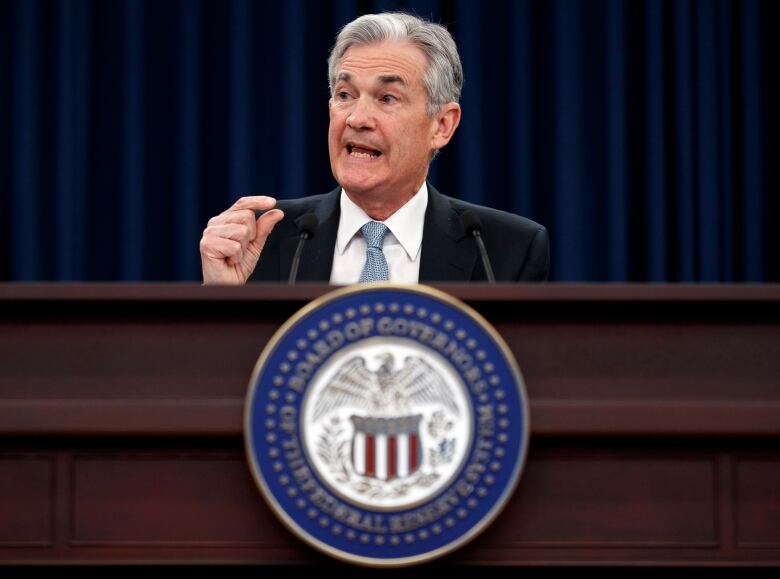A growing trade-fed economy can ease the pain of rising interest rates: Don Pittis
Excitement over a possible NAFTA breakthrough overshadows the gloom of future rate hikes

Interest rates are on the way up. If there were any remaining doubts, U.S. Federal Reserve chair Jerome Powell crushed them like a bug yesterday.
In his first meeting with reporters since replacing Janet Yellen as the world's most powerful central banker, Powell announced a quarter point rate increase and made it clear he thinks the U.S. economy is heating up.
That means over-borrowed Canadians should expect rates to rise here as well.
So far, the big changes in the Fed's expectations on rates come in 2019 and 2020, once the double whammy of U.S. tax cuts and fiscal spending kick in. But a strong economy driven by North American trade could help Canada adjust to gradual rate increases.
More hikes to come
Powell announced he and his advisers have agreed that two more quarter-point rate increases should be enough this year, taking the key federal funds rate to 2.25 per cent by year's end.
But Powell said in the following years, interest rates would rise more steeply than previously expected, possibly reaching 3.4 per cent by 2020.
If Powell is right, and if those rate increases cross the border into Canada as has been the case in the past, indebted Canadians should think about where they will find the cash to pay mortgage rates a whopping two percentage points higher than what they are paying now.

But as Powell reminded the media yesterday, higher rates have their compensations.
"It's true that rates are higher than they've been in ten years," said Powell. "On the other hand, the economy is healthier than it's been since before the financial crisis. So it's a healthier economy than it's been in ten years."
Unlikely loonie spike
For Canadians, news that the U.S., Mexico and Canada are making progress toward resolving the renegotiation of the North American Free Trade Agreement has also helped to take the sting out of rising U.S. rates.
The Canadian dollar actually rose yesterday, the opposite of what you would expect after a U.S. rates hike, climbing about a cent against the U.S. dollar.
- Loonie and peso spike higher on word of NAFTA breakthrough
- U.S. Federal Reserve nudges up interest rates again
Powell came across as reserved and knowledgeable during his news conference, which, unlike those of Yellen or Bank of Canada governor Stephen Poloz, didn't produce a single quip or chuckle.

That may change as he relaxes into the job. But after being appointed by President Donald Trump to replace Yellen, whose tenure was not extended, his goal at this stage is to prove himself as a safe pair of hands. In that respect, Powell succeeded yesterday.
He turned away questions that strayed too far from what he saw as the Fed's role and presented himself as just one voice among many at the Federal Open Market Committee (FOMC), the group that collectively makes decisions about rates and the future of the U.S. economy.
Trade war impact
That's precisely how Powell addressed repeated questions from reporters about the impact of a potential trade war with China on the U.S. economy, which some suggested would lead to price inflation or other economic distortions.
Making it clear the central bank has no remit on trade policy, he said various committee members had passed on concerns raised by businesses about the potential impact of a trade war on their own bottom lines.
"At this stage, what FOMC participants discussed ... it was just that what had been probably a low-profile risk ... has become, you know, a more prominent risk to the outlook," Powell said in response to one question on trade.
Pressed by another reporter about how those risks would show themselves, Powell responded briskly.
"The kind of things people are talking about would be more widespread retaliation and more widespread actions back and forth," he said. "I can't be any more specific than that."
Besides risks for trade, Powell's outlook for the U.S. economy was sanguine.

He saw banking risk as low, with banks well capitalized and willing to undergo stress tests. He thought corporate debt was nothing companies couldn't handle.
The one risk he did see was that of soaring asset prices, a comment that sounded like a guarded warning about stocks and commercial real estate.
"In some areas, asset prices are elevated relative to their longer-run historical norms — you can think of equity prices, you can think of commercial real estate — but we don't see it in housing, which is key," said Powell, describing one place, housing risk, where the U.S. economy differs from that of Canada.
"Overall, if you put that into a pie, what you have is moderate vulnerability," he said.
Perhaps the most revealing part of Powell's outlook was the way he differed from the man who appointed him.
Like many people who truly understand their subject, Powell clearly confessed to its limitations as well as his own. He noted that making firm predictions three years into the future is highly unreliable.
And based on his years advising people in business, he reminded reporters that using low interest rates to stimulate investment — one of the core tenets of central bank policy — is no guarantee that businesses will actually take the money and invest it.
"The cost of capital is one of many factors they'll consider," Powell said. "It isn't the only factor. Or the principal factor."
Follow Don on Twitter @don_pittis
More analysis from Don Pittis
